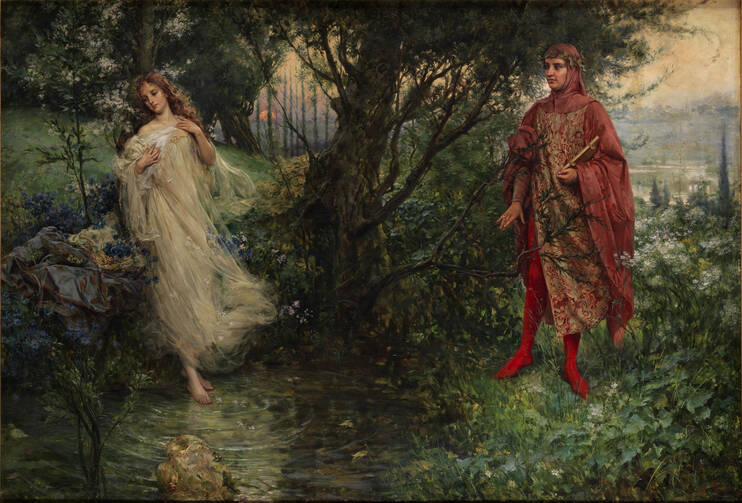A Homily for Mass of Easter Day
Readings: Acts 10:34a, 37-43 Colossians 3:1-4 John 20:1-9
They met at a May Day party. He was eight years old. The girl, a year older. He remembered that she had worn a crimson dress.
Ten years later, he saw her again. She was dressed in white and walking with two companions along a street that borders the River Arno in Florence. They never married. Indeed, they would never be lovers in any sense that we would recognize today, but Dante Alighieri insisted that he forever gave away his heart to Beatrice that day.
The proof of that—if there can be such a thing—is found in the “Paradiso” of Dante’s “Divine Comedy.”The Roman poet Virgil, the personification of ancient wisdom, leads Dante through hell and purgatory, but when the Florentine enters heaven, it is Beatrice, dead some ten years, who is his guide.
Her gaze, pouring through my eyes
On my imagination, made itself my own, and I,
Against our practice, set my eyes upon the sun (I.52-54).
To borrow a phrase from Paul McCartney, is the “Paradiso”only “another silly love song”? Is Dante no more than a 14th-century romantic, employing a trope someone such as Irving Berlin would make even more famous in the 20th century, that being in love is like being in heaven?
Heaven, I’m in heaven
And my heart beats so that I can hardly speak
And I seem to find the happiness I seek
When we’re out together dancing cheek to cheek
Or has this deeply Catholic poet identified a key element in the meaning of Easter, that love alone grants access to heaven, just as only those who loved Christ could see his resurrected glory?
To appreciate the depth of Dante’s insight, we must jettison a few misleading notions about heaven. First, heaven does not enter history primarily as a place. No, it could more properly be called a person, namely, Jesus of Nazareth, wondrously restored to life and, even more importantly, restored to those who love him. So one might say that, more than a hidden region of reality, heaven is primarily a relationship.
Indeed, contrary to our contemporary understanding of the event, the Jesus who emerges from the empty tomb shows no interest in proving his resurrection to unbelievers. He does not return from the dead to taunt Pilate or to show the Jewish leaders how wrong they were. No, he is entirely focused upon restoring himself to those whom he loved.
Why is this important? Why does it matter to us? Because nothing has changed. Jesus is still a lover, not a lawyer. Indeed, one might say, Easter is for lovers!
With apologies to would-be lawyers, if the existence of heaven is something you wonder about, if resurrection from the dead is a notion you surely hope is true, Easter will not set your mind at ease. It does not prove anything. It is not supposed to. Easter is not a piece of evidence. It is an invitation to fall in love.
If one is standing outside the experience of faith, looking in, the presumed sequence runs something like this: If I could find proof, then I would believe. And if I believed, then I could love God and be loved by God in turn. Then, all would be well, but, sadly, that giant “if” blocks my entrance to happiness, like that big stone at the entrance to the tomb.
But in the life of grace, which we announce today, it is all quite the opposite. You begin by falling in love, first with the beauty of the Easter story. Then you realize that someone whom you cannot see, whom you cannot even imagine, does indeed love you. The Jesus of the story manifests himself to you as you pray.
Someone could ask you to prove his existence, but that question is like asking you for evidence that someone loves you. You know that you are loved. What you do not know is how you could possibly offer proof of such love to an inquisitive stranger, especially to someone who has never been in love, who has no idea what love is. This is why the great St. Augustine, in explaining the mystery of God, said with no little exasperation, “Show me a lover and he or she will understand.”
In the “Paradiso” poem, Beatrice says much the same to a dull-witted Dante, who cannot comprehend that love has granted him access to heaven, that love alone makes heaven comprehensible.
And she, who knew me as I knew myself,
To calm my agitated mind
Before I even had begun to speak, parted her lips
And said, “You make yourself dull-witted
With false options, so that you cannot see
What you would understand, had you but cast them off (I.85-90).
To sum up, on this Easter morn: Prayer does not follow proof. Prayer makes proof superfluous. It is a way of loving, which is the deepest form of knowing. And before heaven is a region, it is a relationship. It is love.
And Easter? Yes, it is another silly love song. Indeed, the silliest! But is it true? There you go again! As St. Augustine said, “Show me a lover.”








